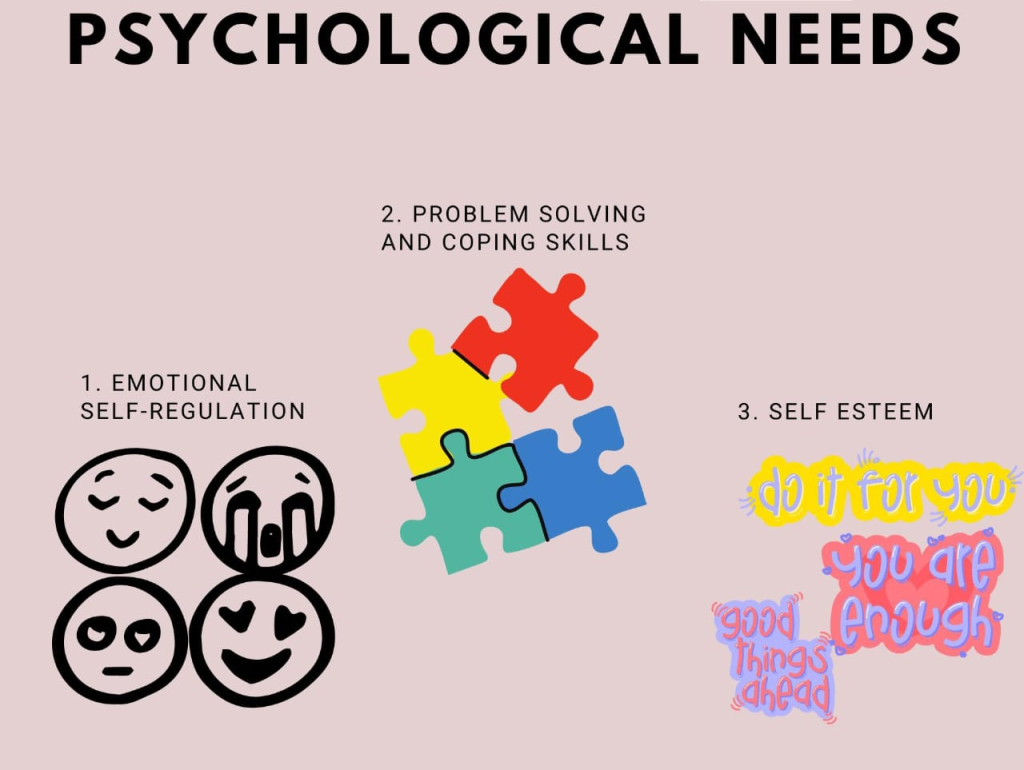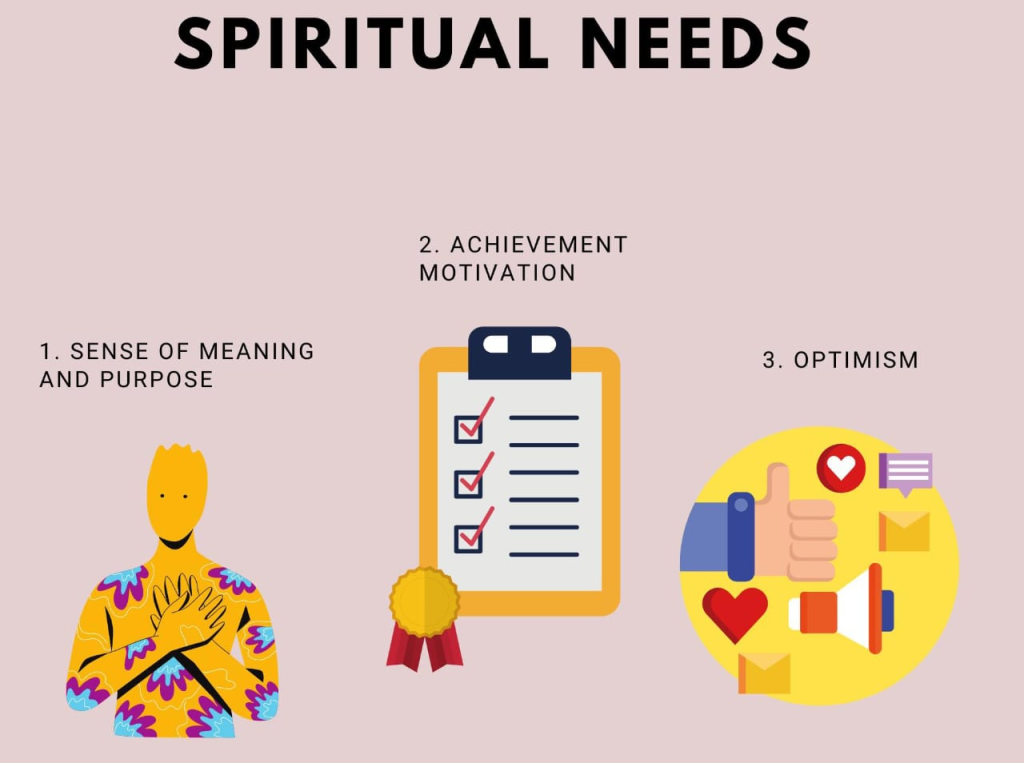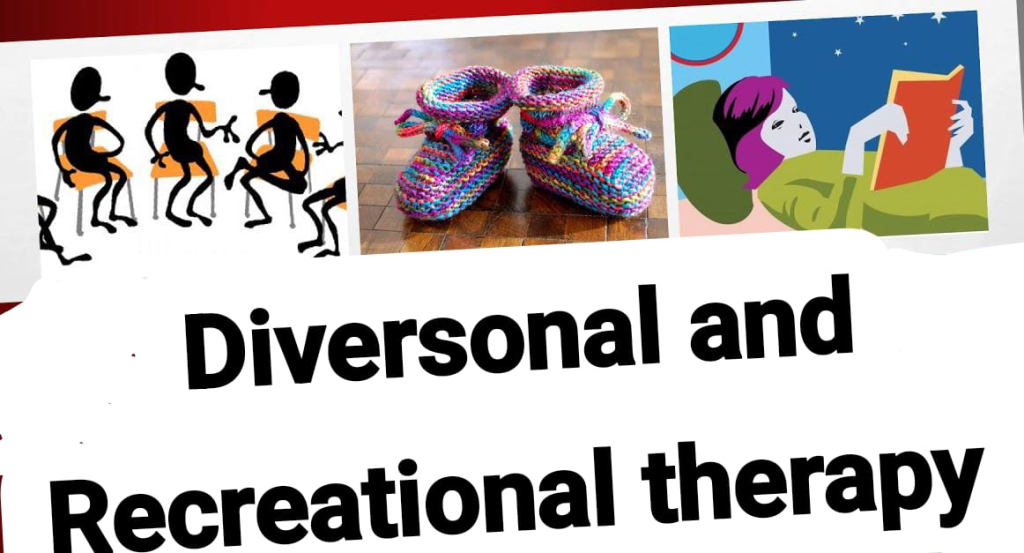ENGLISH-FON-GNM UNIT-3-PART-5- PSYCHOLOGICAL AND SPIRITUAL NEED-UPLOAD
Psychological and spiritual needs

- For good health and well-being, along with physical needs, psychological and spiritual needs are equally important.
- However, we give less importance to psychological and spiritual needs than physical needs.
- Therefore, to promote health, it is necessary to fulfill its psychological and spiritual needs as well.
- Psychological and spiritual needs are It is a bit more complex and difficult to measure than physical needs.
Importance:
Psychological and spiritual needs are essential for holistic care, particularly in health care settings. These needs affect the patient’s overall well-being and recovery process.
Psychological needs:

- By fulfilling psychological needs, individuals can cope with emotional stress, anxiety, and depression caused by illness, pain, or the hospital environment. Mental health directly affects physical health outcomes, so it is very important for nurses to monitor and support patients’ psychological needs.
- Psychological needs are a type of emotional, social, and cognitive requirement that is essential for human well-being as well as mental health and development.
- These psychological needs can be understood through the Maslow Hierarchy of Needs given by Albert Maslow.
- Love Belonging as a Psychological Need Needs such as need, esteem need, self-actualization need are included.
Spiritual needs:

Spiritual needs involve finding meaning, purpose, and connection, especially during challenging times. This may include religious practices, meditation, or simply finding peace and comfort in one’s own beliefs. During illness, grief, or end-of-life situations, patients often turn to spiritual needs, which can provide them with comfort and peace of mind.
- Spiritual needs are an important part of patient-centered care (PCC). It is also a key component for the emotional wellness of the patient.
- Spiritual needs are a fundamental aspect of a person’s well-being.
- The main concept of spiritual needs is that a person should know the meaning and purpose of their life and see the patient as a person.
- Spiritual needs are found differently in all individuals, depending on the person’s beliefs, life experiences, and cultural background.
Write down spiritual need
- Need for Meaning and Purpose
- Need for Inner Peace
- Need for Trust
- Need for Love and Forgiveness
- Need for Spiritual Practice
- Need for Hope and Resilience
- Need for Ritual and Practice
- Need for Moral and Ethical Guidance
The importance of fulfilling psychological and spiritual needs needs ):
Holistic Healing: Focusing on both psychological and spiritual wellbeing promotes holistic recovery by complementing both mind and body.
Improved Outcomes: Meeting these needs can improve coping mechanisms, reduce stress, and promote a more positive outlook, leading to better physical health outcomes.
Quality of life: Accepting and supporting psychological and spiritual health can significantly improve a patient’s overall experience, comfort, and satisfaction with care.
Write down importance of psychological need

- Psychological needs affect a person’s mental status and mental health.
- As psychological needs are fulfilled, a person stays away from stress, anxiety, depression and other mental health issues.
- A person can cope up with any challenges or situation.
- Personal growth is seen in a person due to meeting psychological needs.
How to full fill psychological need of patient in the hospital (How to fulfill psychological need of patient in the hospital)
- To provide good care to the patient Provide patient-centered care in an environment.
- Respect and value the patient and their family members.
- Provide care that is sensitive to the patient’s values, beliefs, and culture.
- Provide a comfortable environment for the patient.
- Maintain patient privacy.
- Patient And maintain self-respect.
- Explain in the patient’s language before performing any procedure.
Write importance of spiritual care

- Spiritual care provides comfort and emotional support to a person. In addition, spiritual care removes the negative feelings and anxiety in a person.
- Rituals, prayers and other spiritual practices provide solace and provide coping strategies to deal with the situation.
- Spiritual care provides the facility of holistic healing.
- Spiritual care helps a person get social support and helps him stay connected with people in the community. It also removes the feeling of isolation.
- Spiritual care helps to remove the fear of death in people with terminal illness, and it helps to accept the situation and promotes peace.
- Spiritual care provides moral and ethical guidance for making life decisions.
Nurses’ Role in Psychological and Spiritual Needs (Nurses’ Role in Psychological and Spiritual Needs):

- Assessment:
- Nurses are often the first to identify psychological and spiritual problems. They can assess for signs of anxiety, depression, or spiritual discomfort and communicate this to the rest of the health care team.
- Emotional Support:
- Nurses can also provide emotional support through active listening, empathy, and encouragement. Building trust with patients can help them talk openly about their fears, frustrations, or spiritual concerns.
- Referrals:
- If necessary, the nurse may refer the patient to mental health professionals, spiritual care counselors, or religious leaders to ensure that the patient’s needs are fully met.
- Comfort and coping strategies:
- The nurse’s beliefs and values as a patient Can provide coping techniques such as relaxation exercises, mindfulness, and spiritual practices that are compatible with.
- Respect and cultural sensitivity:
- The nurse should respect the patient’s spiritual and mental needs, ensuring that care is consistent with their cultural beliefs and preferences.
Diversional and Recreational Therapies:

- Diversional and Recreational Therapies Reduce Stress Plays an important role, as it helps in diverting the mind of the person from the current situation to different situations. In these activities, the person is able to do some physical activities which require more attention and hence it creates interest in the person in a particular course/activity. There are mainly the following diversionary and recreational activities which help in reducing stress.
- 1)Music therapy:
- In this music therapy, we can provide a music system with audio cassettes etc. of the client’s own test. It can be given as per the client’s preference. We can provide religious cassettes and other client choices.
- 2) Hobbies According Activities:
- Ask the client about his hobbies and convince him to do activities related to his hobbies. This will create more interest in the client and his mind will also be diverted.
- 3) Play Activities (Play Activities) :
- Play activities involve the client in playing carrom-board, chess and badminton. Involve the client in playing for recreation and enjoyment only.
- 4)Reading :
- Create interest in reading religious, happy ending novels to the client.
- 5)Painting :
- Painting is helpful in reducing stress, even in clients who do not like working/playing with a group. The necessary colors, sketches and other materials for painting have to be provided. If the client does not tell us, it also helps in knowing the cause of stress, because some clients express the causes of stressful situations through painting or drawing.
- 6) Yoga:
- Yoga helps in keeping a person physically and mentally healthy. If the client has knowledge about yoga, we have to encourage the client to do yoga by telling them its positive results. If he/she does not have any knowledge, arrange someone to help him/her do the “Yoga Asanas”.
- 7) Exercise:
- As per a famous saying “A healthy body maintains a healthy mind” exercise is very beneficial in reducing stress, because many times it happens that when a person is not physically fit, his/her stress level increases, so the client is encouraged to take a morning walk, do simple exercises which helps in making good use of free time and also in reducing stress. Helps.
Recreational therapy

- Recreational means entertainment.
- Recreational therapy is also known as therapeutic recreation.
- This is a kind of systemic process in which a person’s physical, emotional and social well-being is improved by using structured activities and leisure time.
- Recreational therapy is used with people facing a variety of health challenges. Such as physical disability, chronic illness, mental health disorder, developmental disorder.
- Recreational therapy is mainly used in hospitals, rehabilitation centers, nursing homes, and centers providing mental health facilities.
Write key elements of recreational therapy

- Purposeful activity (Purposeful activity)
Recreational therapy is a purposeful activity that is recognized based on the patient’s interests, abilities, and goals. This includes activities such as sports, arts and crafts, musical therapy, animal assisted therapy, gardening, and group outings.
- Personalized goal
Each recreational therapy has its own personalized goal, which is determined keeping in mind the patient’s needs. Such as enhancing motor skills, improving mood, boosting social interaction, increasing self-esteem.
- Physical and mental benefits
Physical activity improves strength, coordination, and endurance, while creative and social activity relieves stress, depression, and improves cognitive function
- Social engagement
Recreational therapy plays an important role in social interaction, relationship building, teamwork, and developing communication skills. is.
- Skill development
Coping skills are developed in the patient. It is also useful for improving the quality of life.
Write down recreational activities
- Outdoor Activities:Outdoor activities include activities like hiking, camping, fishing, boating, cycling, swimming, scuba driving, picnics, etc.
- Sports and physical activities: Sports and physical activities include activities like basketball, baseball, volleyball, tennis, golf, swimming, dance, yoga.
- Creative and Artistic Activities: Creative and artistic activities include activities like painting, drawing, crafts, poetry writing, music, singing, photography, videography. is.
- Educational and mental activities: Educational and mental activities include reading, puzzles, brain games like Sudoku, chess, crosswords, and many other activities.
- Recreational and wellness activities: Recreational and wellness activities include meditation, mindfulness, spas, and wellness Activities include activities like gardening.
Write benefits of recreational therapy

- Physical health improves due to exercise and physical activity.
- Emotional resilience increases and stress, depression and anxiety are eliminated.
- Social connections and social relationships increase.
- Cognitive improvement is observed.
- Memory, problem-solving skills, attention increase.
- Self-confidence increases.
- Quality of life improves.
Diversional therapy

- Diversionary therapy is a patient-centered approach or client-centered practice. In which the quality of life of a person is improved by using leisure (free time) and recreation.
- Diversionary therapy is useful for maintaining and promoting the individual’s emotional, mental, and social well-being.
- The main goal of diversionary therapy is to improve the individual’s quality of life, reduce feelings of isolation, and prevent boredom and anxiety.
- Diversionary therapy includes a variety of activities. Activities such as art and craft, music, gardening, games, physical exercise, storytelling, social events, etc. are included.
- This therapy is mainly used in old age patients, patients with disabilities, patients receiving palliative care, and patients experiencing mental health challenges.
- The therapist who provides diversionary therapy is known as a diversionary therapist.
- This therapist works closely with the patient and develops relationships, Promotes stimulation, social interaction and enjoyment.
Write benefits of diversional therapy

✓ Physical benefits

- Increases Sense of Well Being
- Control Blood Pressure and Heart Rate
- Increases Bone Mass and Strength
- Increases Muscle Strength
- Increases Lung Capacity
- Reduction in Incidence of Hypertension, Diabetes
- Improvement in Immune System
✓ Emotional benefits :

- Autonomy
- Improve Self Confidence
- Improve Self Concept
- Improve Self Esteem
- Improve Memory
- Moral
- Happiness
- Sense of Freedom
- Life Satisfaction
- Relieve Stress and Boredom
- Build Social Connection
- Decreases Feeling of Social Isolation
- Enhances Mood
Write advantages of diversional therapy
- Improve Mental Health
- Enhance Social Interaction
- Boost Cognitive Function
- Promote Physical Health
- Provide Sense of Purpose
- Support Emotional Well-Being
- Individualize Care
- Increase Engagement and Satisfaction
- Reduce Behavioral Problems